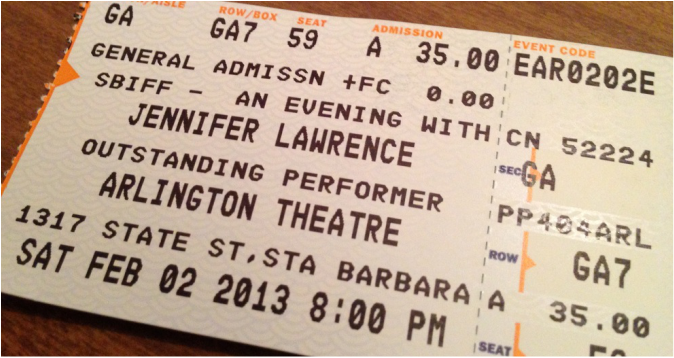More than anything, Jennifer Lawrence appears normal, perhaps the most shocking revelation of the night. She doesn’t bother smiling unless something is particularly funny, and even then, only for a moment. She has a vocal filter, but mostly forgets to use it. Only a charming, sidelong glance to the audience—which she employed about a dozen times throughout the night—betrays a bit of personal relations practice. It’s as though her publicist despaired of presenting a fully-polished Jennifer, and instead decided that one good glance would have to suffice.
Lawrence’s commonplace manner perplexes all the more given the actress’s incredible cinematic résumé. Her steely, battered-but-not-broken determination as Ree in Winter’s Bone displays a control and maturity vanishingly rare for 19-year-old thespians. In The Hunger Games, Lawrence instills Katniss with a compelling depth of emotion, particularly impressive given the relative flatness of Suzanne Collins’s novel. Blending a fierce survival instinct with a soft, damaged heart, she shoulders (and exceeds) national expectations. In her most memorable performance yet, Lawrence plays Tiffany, the damaged-goods widow from Oscar-nominated Silver Linings Playbook. Her playful arrogance commands the film, stealing the show from Bradley Cooper (Pat) and even Robert DeNiro (Pat Sr.).
Midway through the interview, the Arlington Theatre played her best scene from Playbook, in which she lambastes DeNiro’s character for assuming she’s brought bad luck to his beloved Philadelphia Eagles. Whirling around the living room like a Tasmanian devil, she locks eyes, snarls, and spits her way through a part-frightening-part-hilarious diatribe, leaving DeNiro’s Pat Sr. with a blank look and slouched, chastened posture. Back in the theatre, Durling asked how long it must have taken to prepare for the scene. With a rare smile, Lawrence said:
I never actually read my lines until I show up, and that was not a good day to do that, with a two-page monologue. I was just focused on memorizing it and trying to get through it, all morning. So, by the time it actually came time to do that scene, it was great. I didn’t realize until midway through the monologue, and then I thought, “You are Robert DeNiro, and I am shouting at you,” because I was so busy trying to remember [my lines].
I guess, but I feel like everybody has that. I couldn’t write. I couldn’t take pictures. I’m a horrible photographer. There are people who are just so visual. My friend can write the most beautiful songs you’ve ever heard in your entire life, in 10 minutes. I could never do something like that. Everybody has their gifts.
When the interview ended, the Arlington began playing Alicia Keys’s “Girl On Fire.” Lawrence strode across the stage to receive her “Outstanding Performer of the Year” award, and for the first time all evening, she played the part of celebrity with the full polish and flare one would have expected. She stood, smiling, plaque held gracefully, cameras flashing, Alicia Keys’s soulful anthem rising in crescendo. I glanced down briefly as I gathered my things to leave, thinking of Quentin Tarantino in that same spot just a few nights earlier. He had savored his moment of adulation, glad-handing guests, remaining long after many had exited the theatre. I looked back at the stage one last time. Lawrence was already gone.
No doubt I’ll see Lawrence again several years from now, whether in a television interview, film Q&A, or another movie awards ceremony. I imagine her publicist will have taught her another dozen glances, that she’ll be far more composed from the outset, that she’ll have rehearsed this sort of thing hundreds of times. I look forward to seeing how Lawrence’s career grows, but a part of me will be sad to have seen the pleasantly awkward, no-filter Jennifer fade away. She’ll probably be a little sad herself.


 RSS Feed
RSS Feed
